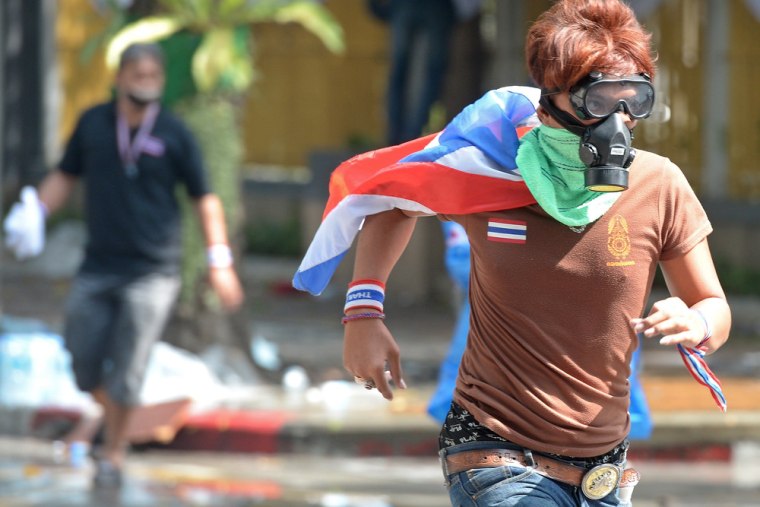BANGKOK - Thailand's Election Commission on Thursday urged the government to delay polls scheduled for Feb. 2 after hours of violent protests, adding to political uncertainty in the country.
The government of Prime Minister Yingluck Shinawatra has been insisting the polls should go ahead as planned. The protest movement seeking to oust her is demanding they be delayed, and has vowed to disrupt them.
In a statement, the commission said it was urging the government to consider "postponing the elections," citing the lack of "peace" between the government and protesters.
Government officials didn't immediately answer calls seeking a response.
The development followed violent protests between demonstrators and police outside a sports stadium where candidates were gathering to draw lots for their position on polling papers.
The demonstrators, some armed with sling shots, threw rocks and attempted to break through police lines. Officers fired tear gas and rubber bullets. At least 48 people were injured. Police said one of its officers had sustained a bullet wound, presumably fired by protesters.
Inside the stadium, candidates for at least 27 parties took part in the lot-drawing process, which went on unaffected despite the turmoil outside the gates.
Four election commissioners left the stadium on a helicopter, according to a spokesman for the body.
Three officers were injured, said police Col. Anucha Romyanan. He urged the demonstrators to assemble peacefully and said "attempts are being made to escalate the political situation by causing violence."
The clashes were contained to the area around the stadium but stretched into the morning. It was the first violent incident in nearly two weeks of daily protests on the streets of Bangkok.
The protesters have been demanding that Yingluck step down since mid-October, and street unrest has occasionally broken out. They oppose the polls because Yingluck is seen as sure to win them.
Police have largely shown restraint and have made no move to arrest the ringleader, Suthep Thaugsuban, who is demanding the country be led by an unelected council until reforms can be implemented.
Thailand has been wracked by political conflict since Yingluck's brother, former Prime Minister Thaksin Shinawatra, was toppled by a 2006 military coup. The protesters accuse Yingluck of being a proxy for Thaksin, who lives in self-imposed exile to avoid jail time for a corruption conviction but still wields influence in the country.
Thaksin or his allies have won every election since 2001 thanks to strong support in the north and northeast of the country. His supporters say he is disliked by Bangkok's elite because he has shifted power away from the traditional ruling class, which have strong links to the royal family.
On Wednesday, Yingluck announced a proposal for a national reform council to come up with a compromise to the crisis, but it was rejected by the protesters. They now plan more civil disobedience and street protests in a bid to provoke such chaos that Yingluck will be forced to resign as caretaker.
The country's main opposition party, which is allied with the protesters, is boycotting the elections, which Yingluck called early in hopes of giving her a fresh mandate and defusing the crisis.
Yingluck led the country for two years relatively smoothly. But in October, her government tried to introduce an amnesty law that would have allowed Thaksin to return to the country as a free man, sparking the latest round of unrest.
Related: Protesters swarm in Thai capital to demand PM resign
